Local SEO optimization refers to improving your business’s visibility in location-based online searches. It’s how small businesses ensure they show up when nearby customers search for products or services they offer. In an age where “46% of Google searches have local intent and 72% of consumers who perform a local search visit a store within 5 miles”, mastering local SEO strategy can translate directly into more foot traffic and sales.
The benefits for small businesses are significant. By targeting local customers at the moment they’re searching, you connect with ready-to-buy consumers and compete effectively against larger brands on your home turf.
In this guide, we’ll explore 15 actionable local SEO strategies to supercharge your local search presence in 2025 – from Google Business Profile (GBP) optimization to harnessing the latest local SEO trends and tools. You’ll learn how to audit your local website, analyze competitors, optimize for new conversational search and AI overviews, and leverage customer reviews.
We’ll also touch on emerging Local SEO trends for 2025 backed by research, and how integrating AI and automation can streamline your local marketing. By the end, you’ll have a roadmap of proven Local SEO tactics and best practices to outrank your local competitors and capture more local customers in 2025.
Table of Contents
What is Local SEO Optimization?
Local SEO optimization is the process of improving your online presence to rank higher in local search results, such as Google’s Map Pack and localized organic listings. In plain terms, it means optimizing your website and business listings so that people nearby can find you when they search for services you offer.
This involves tactics like refining on-page content with location keywords, building local citations, and managing your Google Business Profile. The goal is to connect you with nearby customers and appear prominently for searches like “[service] near me” or “[product] in [city].” For example, Local SEO boosts your business’s visibility in location-based searches, helping you connect with nearby customers and rank higher on Google Maps. In short, if your business serves a specific area, local SEO ensures you show up exactly when and where your customers are looking.
Why Local Search Optimization is Important for Your Business?
Local search optimization is critically important because it targets the customers most likely to visit your store or service. Think about the last time you searched for a cafe “near me” or a plumber in your city – you probably contacted one of the top results. By investing in local SEO, your business can “get discovered by customers in your area at the exact moment they’re searching for a product or service,” as one expert notes. Local searches often come from users who are ready to act – studies show 76% of consumers who search “near me” visit a business within a day, and many of those searches lead to purchases. This means local SEO drives highly qualified traffic. Even if you don’t have a physical storefront, appearing in local results builds trust and awareness among nearby audiences.
Moreover, if people can’t find you, they can’t buy from you. By optimizing for local search, you ensure your business is visible when it counts, giving you a chance to capture customers that might otherwise go to competitors. In sum, local SEO is important because it delivers ready-to-buy local customers to your business, increases in-store visits, and helps you compete effectively in your community.
What are the benefits of Local Search Engine Optimization?
Local SEO offers numerous benefits for small and medium businesses. Here are some key advantages:
- Increased Local Visibility: Appearing in the local 3-pack and map results puts your business front and center for nearby searchers, boosting brand awareness in your community. Nearly 4 in 5 consumers use search engines to find local information, so better visibility means more opportunities.
- More Foot Traffic and Leads: Local SEO drives physical visits and inquiries. For example, ranking for “best [service] in [Town]” can funnel high-intent customers right to your door. 76% of “near me” searchers visit a business within 24 hours, and many of those visits convert to sales.
- Higher Trust and Credibility: Showing up in local results, especially with strong reviews, signals that your business is reputable. Consumers tend to trust businesses that Google highlights. A complete Google Business Profile with positive reviews can make you 2.7 times more likely to be considered reputable by customers.
- Cost-Effective Marketing: Local SEO is often more cost-effective than broad advertising. It targets people actively looking for your services, yielding a high return on investment. In fact, local SEO can get you in front of your audience without burning through ad dollars, making it a budget-friendly strategy for small businesses.
- Competitive Edge: By optimizing locally, you can outrank competitors who aren’t as savvy. Many small businesses have yet to fully embrace local SEO, so a focused effort can let you leapfrog past rivals in search rankings, capturing market share in your area.
How to Improve Local SEO?
Improving local SEO involves a combination of on-site optimizations, business listing enhancements, and content/local link strategies. To get started, ensure your website clearly specifies your location and services, and that your NAP (Name, Address, Phone) is consistent everywhere online.
Next, claim and optimize your Google Business Profile and other directory listings. Earning positive reviews and local backlinks will further boost your authority. In essence, bolstering local SEO means covering all bases: technical SEO for your website, relevant localized content, and active management of your business’s presence across Google and other local platforms. Below, we dive into 15 local SEO strategies – each with tips and best practices – to elevate your local search performance in 2025.
15 Local SEO Strategies with Tips & Best Practices
Here we will discuss the 15 local SEO strategies with tips and best practices to improve your website ranking and outrank your competitors –
1. Start with a Comprehensive Local SEO Audit
2. Research and Analyze Your Top Local Competitors
3. Identify High-Intent Local Service Keywords
4. Create Location-Specific Landing Pages
5. Optimize Your Service Pages with Target Keywords
6. Deploy Hyperlocal Service Pages
7. Create Localized Content
8. Optimize Content for Conversational Search and AI Overviews
9. Ensure Your Website is Mobile Responsive
10. Use Local Business Schema + Review, FAQ, and Image Schema
11. Create Digital PR and Local Citations
12. Optimize Your Google Business Profile (GBP)
13. Create Location-Intent Video Content
14. Integrate Customer Voice in Reviews and Testimonials
15. Track & Optimize for Behavioral Signals
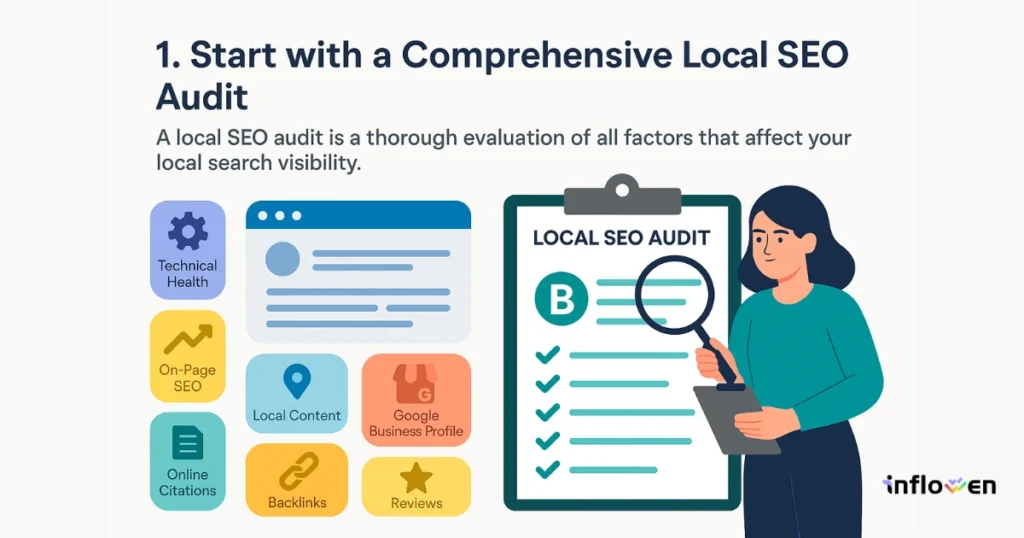
1. Start with a Comprehensive Local SEO Audit
A local SEO audit is a thorough evaluation of all factors that affect your local search visibility. This includes your website’s technical health, on-page SEO, local content, Google Business Profile, online citations, backlinks, and reviews. The goal is to identify strengths, weaknesses, and areas for improvement. Essentially, you’re creating a baseline “report card” for how well your business is optimized for local search.
Tips: Begin by auditing your website for any technical issues (broken links, slow load times, mobile usability) and on-page elements (does each important page target a local keyword and have location info?).
Next, audit your Google Business Profile – is it claimed, verified, and fully filled out with accurate information and photos? Check your presence on major directories (Yelp, Facebook, Yellow Pages, etc.) for NAP consistency.
You should also audit your online reputation: what do your reviews look like, and what is your average rating? A comprehensive Local SEO Audit will uncover if there are technical SEO problems, content gaps, or off-page factors holding you back.
Best Practices: Use tools to streamline the audit. For example, you can run a complete SEO audit of your website using platforms like SEMrush or Moz to catch technical and on-page issues. For the local-specific part, tools like Moz Local, BrightLocal, or Whitespark can help identify missing or inconsistent citations and other local SEO factors.

2. Research and Analyze Your Top Local Competitors
This technique involves studying the businesses that consistently rank at the top of local search results in your industry/area. A local competitor analysis looks at what those competitors are doing for SEO – their website content, keywords, backlinks, Google Business Profile, reviews, and social media – to identify tactics that work and opportunities for you to differentiate. Essentially, it’s learning from the winners in your local market.
Tips: Start by identifying 3-5 main local competitors (the ones ranking on page one or in the map pack for your target keywords). Perform a local competitor analysis of their online presence. Check their websites: What keywords do they target on key pages? Do they have separate locations or service pages? How is their site structured?
Next, examine their Google Business Profiles – note their categories, the quality and quantity of photos, how many reviews they have, and their average rating. Also, search for their business name to see where they are listed (this can reveal directories or niche sites you might have missed).
Look at their backlink profile using SEO tools (many tools let you see who’s linking to their site). This can uncover local sponsorships or partnerships (if, say, they are listed on the local chamber of commerce or sponsoring local events). Don’t forget to read some of their customer reviews; this can reveal what customers value about their service (and you can emphasize similar strengths in your marketing).
Best Practices: Use tools like SEMrush or Ahrefs to compare keyword rankings and backlinks between you and your competitors. If a competitor is outranking you for “{service} in {city},” analyze that specific page – how is their content different or better? Perhaps they have a longer, more informative page or more local links pointing to it. Look for content gaps: topics or keywords they target that you haven’t addressed yet.
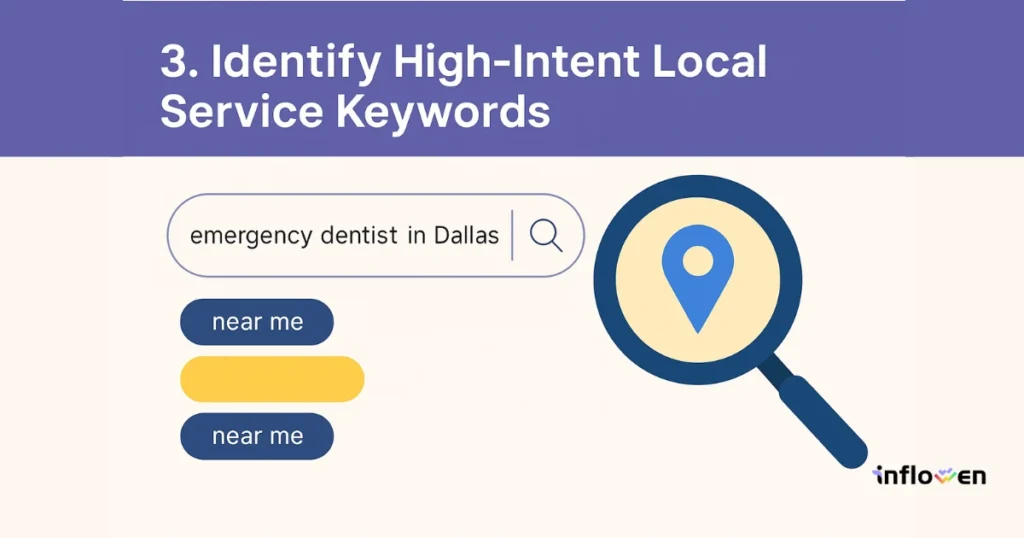
3. Identify High-Intent Local Service Keywords
High-intent local service keywords are the search terms that indicate a strong intention to purchase or hire a service in your area. These often include specific services + location (e.g., “emergency dentist in Dallas”) or phrases like “near me,” and they usually come from consumers close to making a decision. Identifying these keywords means finding out exactly what terms your potential customers use when they’re ready to convert, and then targeting those terms on your site.
Tips: Conduct localized keyword research. Use tools like Google Keyword Planner, Moz, or SEMrush to discover search terms related to your business with location modifiers. Look for longer-tail phrases that show intent, for example, “[service] open now near [town]” or “[best/top] [service] [city].” Brainstorm common ways people describe your service in informal language, too; oftentimes, voice search queries are phrased as questions or full sentences (e.g., “who is the best plumber in Springfield?”). Check your own Google Search Console data for queries that contain your city or neighborhood name – there may be opportunities you haven’t optimized for yet.
Another tip: perform some Google searches as if you were a customer and see the “People also ask” questions and related searches; these can reveal useful keywords or topics to cover. Once you have a list of high-intent local keywords, map them to specific pages on your site (or plan to create new pages for them). For example, your homepage might target a broad term like “{Your Service} in {City},” while a subpage might target “affordable {service} {City}” or specific neighborhoods.
Best Practices: Identify high-intent local service keywords and integrate them strategically into your site content and meta tags. Prioritize keywords that are most directly tied to conversions – those indicating someone is ready to book or buy (like “hire,” “repair near me,” “price,” etc., combined with location). Use each target keyword in the page title, H1 heading, URL (if appropriate), and naturally throughout the content.

4. Create Location-Specific Landing Pages
Location-specific landing pages (also known as location pages or city pages) are dedicated pages on your website for each geographic area you serve. If your business has multiple locations or serves multiple cities/regions, each of these pages provides tailored content about that area, such as the store address, the services offered there, testimonials from local customers, and relevant local landmarks or directions. Even if you have a single physical location but serve distinct neighborhoods or service areas, creating pages for those can improve your visibility for searches in those areas.
Tips: Let’s say you operate in three neighboring towns – create a page for each town, rather than trying to list everything on one page. On each location-specific landing page, include the city name in the title tag, URL, and headings (e.g., “Plumbing Services in [City], [State]”). Describe your services as they relate to that location: mention neighborhood names, directions (distance from known landmarks or highways), and any location-specific offers.
Embed a Google Map of your business location on the page for credibility and user convenience. Also, add unique content – perhaps highlight a project you did in that area or a local customer success story, to avoid having pages that are just cookie-cutter duplicates except for the city name (duplicate content can hurt SEO). If you have physical offices, include full NAP info and maybe a photo of that storefront. For service-area businesses, you might not list an address, but you can still speak about your experience in that area (e.g., “Serving the Greater Denver area, including [list of suburbs]”).
Best Practices: Design your website’s structure to accommodate multiple location pages in an organized way. For example, you might have yoursite.com/locations/city-name/ as a URL structure. If starting from scratch, consider the site architecture during the design phase – you can even design a website from scratch that plans for scalable location-specific pages. Ensure each page has unique, valuable content – simply swapping out city names won’t cut it.
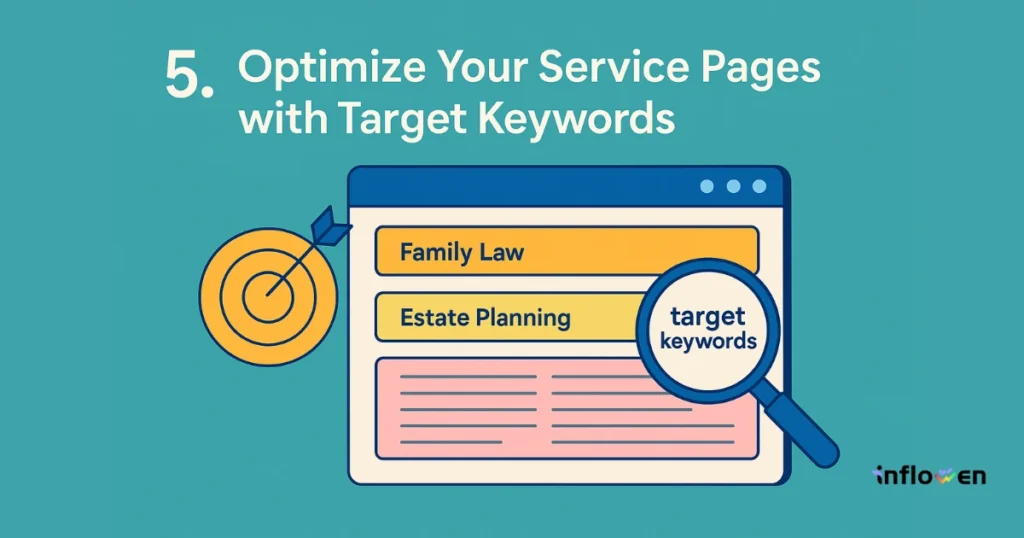
5. Optimize Your Service Pages with Target Keywords
Service pages are the pages on your site that describe the specific services or products your business offers (for example, a law firm might have separate pages for “Family Law,” “Estate Planning,” etc.). Optimizing these pages means making sure they are fully SEO-friendly and locally relevant: each service page should target relevant keywords (including local modifiers where appropriate), have thorough and useful content, and be structured to rank well in search results.
Tips: First, ensure you have a dedicated page for each core service you provide. Don’t lump all services on one generic page – splitting them allows you to target keywords for each service more precisely. For local SEO, weave in the location naturally: e.g., the title tag could be “{Service} in {City} – {Business Name}” to grab both the service keyword and local keyword.
In the content, mention how you deliver that service locally (“We provide {service} for clients across the greater Dallas, TX area…”). Include FAQs on each service page, ideally addressing local considerations (for instance, if one of your services depends on local regulations or climate, mention that).
Be sure to optimize meta descriptions too – include a compelling call-to-action and a local reference (“Call now for {service} in {City}”). Use headers (H2, H3) to break up the content, possibly including questions or subtopics that contain keywords (e.g., “Why choose our {service} in {City}?”). Also, add clear calls to action (like a contact form or phone number) on each service page, because once visitors land there, you want to convert them.
Best Practices: Align each service page with the relevant target keywords from your research. For example, if “emergency HVAC repair [city]” is a high-intent keyword, make sure your HVAC service page has a section about emergency repairs in the city. Keep content quality high – aim for at least 500 words (often more) that truly cover what the customer needs to know about that service. Include images or videos of your service in action, with locally descriptive file names or alt text (“Our-truck-at-client-home-in-Dallas.jpg”, etc.).
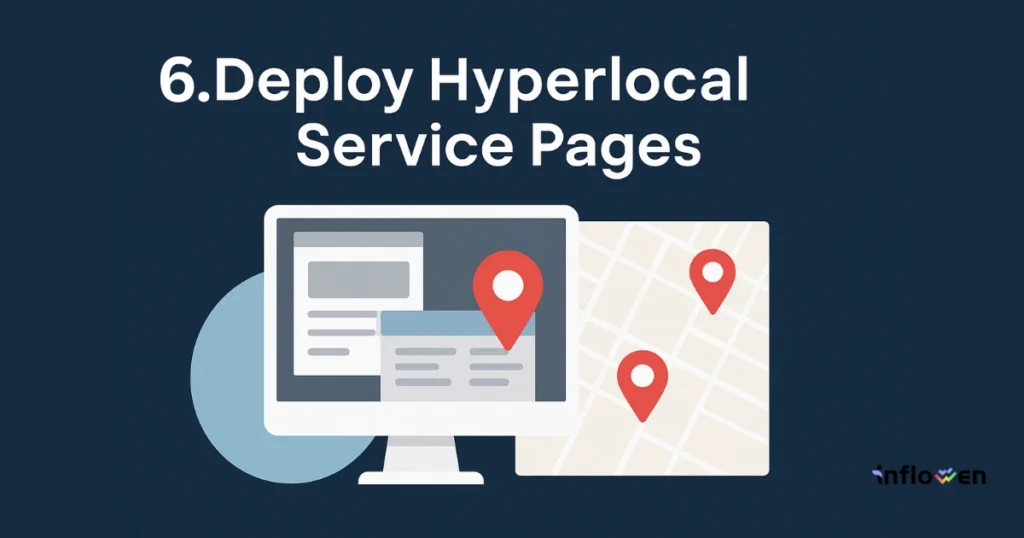
6. Deploy Hyperlocal Service Pages
Hyperlocal service pages take the idea of location pages even further – they target very specific neighborhoods, districts, or small communities within your larger service area, or they focus on extremely specific services/geographic pairings. “Hyperlocal” means narrowly focused on a particular locality or niche. For example, instead of just a page for “Los Angeles,” a hyperlocal approach might include pages for “Echo Park”, “Downtown LA”, “Hollywood”, etc., if your business actively serves those areas. This strategy can also apply to targeting specific service offerings in certain locales if that makes sense (like a page for “Waterproofing services in Manhattan’s Upper West Side” if you have a lot of business there).
Tips: Use hyperlocal pages when there’s search volume or business value at a micro-local level. You might find that people search by neighborhood, especially in big cities (“dentist in Greenwich Village” versus just “New York City dentist”). Create content that speaks directly to those residents.
For instance, on a hyperlocal page, you might reference the neighborhood name multiple times, mention local hotspots (“Just a few blocks from the Eastbrook Mall…”), or community events (“Proud to serve the {Neighborhood} community at the annual {Event}”). These little details show that you truly operate in that area and aren’t just trying to rank. They also help residents feel a connection. If your business is located in one area but you want to reach neighboring small towns, hyperlocal pages can target each town (even if they’re too small to justify a full “location page” with an office, you can target them as service areas).
Keep in mind that hyperlocal pages need to offer unique value – they might vary by highlighting different testimonials from each area or slightly different services (e.g., a landscaping company might emphasize drought-resistant plants on a page targeting a neighborhood with watering restrictions).
Best Practices: Implement hyperlocal pages thoughtfully – you don’t want to overdo it and create thin content for every little locality. Focus on areas where you see demand. Use hyper-local targeting in your keyword integration: specific neighborhood names, ZIP codes, local slang or nicknames if people use them. According to recent trends, hyper-local SEO is on the rise as competition intensifies, with businesses targeting specific neighborhoods to attract nearby customers.
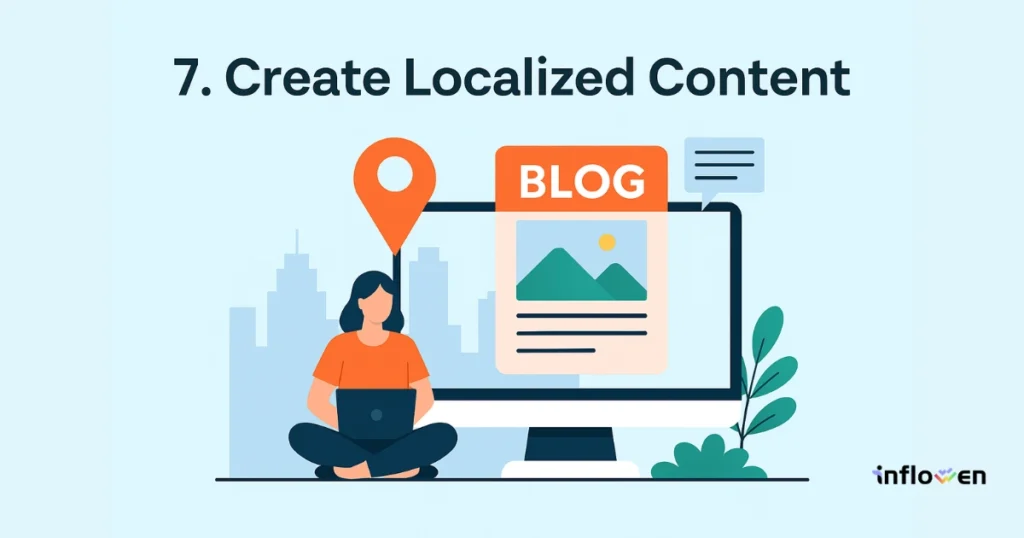
7. Create Localized Content
Localized content refers to blog posts, articles, or other website content that is tailored to local topics or interests relevant to your business. This is content marketing with a local twist – beyond your core service pages, you produce useful or engaging content that resonates with your local audience and incorporates local keywords. Examples might include blog posts about local events, news in your industry that affects your town, “best of” lists in your community, or guides (e.g., a realtor might post a guide to the best neighborhoods for first-time buyers in their city).
Tips: Think about questions or interests your local customers have. For instance, a home improvement store could publish seasonal content like “Winter Home Maintenance Tips for [Your City]” – which naturally lets you talk about local weather conditions and your products. A restaurant might blog about “Our City’s Top 5 Summer Festivals (and What to Eat There).” This kind of content does a few things: it attracts local readers (who are potential customers), it signals to Google that your site is deeply relevant to the locale, and it provides opportunities to internally link to your main pages (helping their SEO).
It can also earn backlinks if people find it useful (for example, a local tourism blog might link to the festival article). Always tie it back to your business subtly – e.g., the home maintenance tips can mention checking your furnace (and you happen to sell furnace filters). For research, use Google Trends or even community Facebook/Nextdoor groups to see what local topics are buzzing. Also consider localized content on external sites: writing guest posts for local publications or sponsoring local content can boost your profile (though that crosses into PR territory, which is also great).
Best Practices: Maintain a content calendar that includes local events and seasonal opportunities. Ensure every piece of localized content targets a specific local keyword or theme (like “HVAC tips for Phoenix heat” – very region-specific need). Use local landmarks or names in your content when appropriate, and include images of local scenes or your team at local venues (with proper alt text).

8. Optimize Content for Conversational Search and AI Overviews
With the rise of voice assistants and AI-powered search tools, more queries are now conversational, meaning people search in full sentences or questions (especially via voice: “Hey Google, where can I get an oil change on Sunday near me?”). Additionally, AI overview features (like Google’s new AI-generated search summaries or Bing’s chat-based search) are changing how content is consumed. Optimizing for conversational search means structuring your content to answer natural-language questions clearly and concisely. Optimizing for AI overviews means ensuring your content is well-structured and rich in factual detail so that AI algorithms can easily digest it and present it in their summaries.
Tips: A practical way to do this is to incorporate FAQ sections on your key pages, addressing common questions in a conversational tone. For example, on a dental clinic page, you might have Q&A like “Q: What’s the best way to find a good dentist in [City]? A: …(your detailed answer)…”. Use question-based headings (“How do I choose the right HVAC contractor in Houston?”) and then answer them directly below.
This format not only caters to voice search (which often involves questions) but can also make your content a candidate for featured snippets (“People also ask”) and the emerging AI snippets. Include trigger words that voice search queries often have: who, what, where, when, why, how, “best”, “near me”, etc., in a natural way. Also, write in a conversational style – think about how someone might verbally ask about your service, and make sure the answer in your content would satisfy that query.
Regarding AI overviews: structure your content with clear headings and logical flow. Use schema markup (like FAQ schema, see strategy #10) to explicitly label questions and answers – this helps search engines understand and possibly highlight your Q&A. Keep your answers concise and informative; often, AI summaries pull a few sentences that seem to directly answer a question.
Best Practices: Focus on long-tail, natural language keywords in your content optimizations. This might mean targeting phrases like “how to fix a leaky faucet in an apartment” as opposed to just “fix a leaky faucet”. Embrace a more conversational tone in blog posts or FAQ pages – it’s okay to write like you speak (to a degree) if it matches what users are searching. Another aspect is optimizing for the new AI chat interfaces. For example, Bing’s AI chat or Google’s SGE (Search Generative Experience) may draw on your content. Ensuring you provide complete answers to likely questions increases the chance the AI will use your site as a source. According to industry experts, businesses will need to provide highly structured, AI-readable content, including FAQs, schema markup, and conversational language that aligns with voice search.

9. Ensure Your Website is Mobile Responsive
A mobile-responsive website is one that automatically adapts its layout and design to look and function well on mobile devices (smartphones, tablets) as well as on desktops. In the context of local SEO, this is crucial because a large majority of local searches happen on mobile devices when people are on the go. Ensuring your site is mobile-friendly (responsive design, fast-loading on mobile, easy to navigate with a finger) means users can find and use your site effectively, which in turn positively impacts your rankings and conversions.
Tips: Use a modern responsive design or theme for your website so that the same URL serves all device types with fluid layouts. Test your site on multiple mobile screen sizes. Key things to check: Does the content resize and reflow without requiring zooming or horizontal scrolling? Is the text large enough to read on a phone? Are buttons and links easily tappable (not too small or too close together)?
Also, verify that important information is front and center on mobile – for instance, your phone number or contact button should be easily accessible without a lot of pinching and zooming. Page speed is especially critical on mobile; compress images, enable browser caching, and consider removing or lazy-loading any heavy elements on mobile view. You can use Google’s Mobile-Friendly Test and PageSpeed Insights tools to diagnose issues.
Given Google’s mobile-first indexing (Google primarily crawls and ranks based on the mobile version of your site), any content or tags that are only on your desktop site but missing on mobile might not count – so ensure the mobile version isn’t stripped down in a way that hurts SEO (e.g., don’t hide all your text behind accordions without making it accessible).
Best Practices: Having a mobile-responsive website is no longer optional – it’s foundational. In local SEO, consider that users might be looking for quick info on mobile, such as your address or click-to-call phone number. Make these prominent. Incorporate mobile-friendly features like a sticky navigation bar or a floating “Call Now” button for easy contact. According to recent data, 87% of smartphone users use search engines at least once a day, and a huge chunk of “near me” searches happen on phones when people are ready to act. If your site doesn’t load fast or display properly, those users will bounce to a competitor’s site (and Google will notice that poor engagement). Use responsive design frameworks (like Bootstrap) or a good CMS template that accounts for different devices.

10. Use Local Business, Review, FAQ, and Image Schema
Schema markup is a form of structured data that you add to your website’s code to help search engines understand the content better. For local SEO, important schema types include LocalBusiness schema (which provides details like your business name, address, phone, hours, geo-coordinates, etc.), Review schema (to mark up customer reviews or ratings on your site), FAQ schema (to mark up question-and-answer content), and Image schema (to provide info about images). Using these schemas can enhance your search listings with rich results, for example, showing star ratings, business hours, or FAQs directly on the search results page, which can improve click-through rates and visibility.
Tips: Implement LocalBusiness schema on your contact page or site footer to ensure Google gets a consistent feed of your crucial NAP details, business type, service area, etc. Many SEO plugins or generators can help create the JSON-LD code for this. Make sure to include your business’s @type (like LocalBusiness, Restaurant, Plumber, etc., whichever category fits best) and all relevant properties (address, geo coordinates, opening hours, price range, etc.).
For reviews, if you showcase testimonials on your site, wrap them in the AggregateRating or Review schema. For example, a page on your site listing customer reviews could include schema that tells Google the average rating (if you have one) and number of reviews. This can lead to star ratings appearing under your listing in Google results, which instantly draws the eye.
FAQ schema: As discussed in strategy #8, if you have an FAQ section on a page, adding FAQPage schema markup can sometimes make those questions appear in the “People also ask” or directly under your search result as expandable Q&As. This not only takes up more real estate in SERPs (search engine results pages) but also aligns with the trend of conversational search.
Image schema (often using the ImageObject type) can be used to give search engines context about images – for instance, for an image of your storefront, you might include schema stating it’s an image of “${BusinessName} located at ${Address}”. This could help with image search and also with Google’s understanding of your business’s identity.
Best Practices: Using schema should be done in addition to human-visible content, not as a substitute. Make sure any data you mark up is also visible on the page (Google’s guidelines discourage marking up “hidden” info that users can’t see). When implementing schema markup, test it using Google’s Rich Results Test tool to ensure it’s free of errors. Local business schema is particularly powerful for local SEO, as it feeds Google Maps and knowledge panels with accurate information.
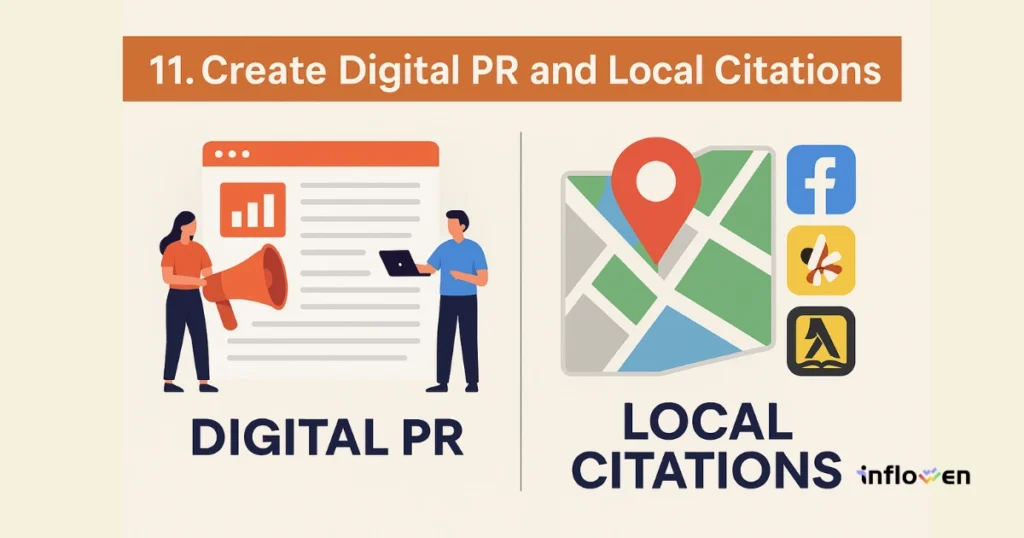
11. Create Digital PR and Local Citations
Digital PR in a local SEO context means getting your business mentioned in online publications or websites, especially local news sites, blogs, or industry sites – often through press releases, articles, or contributions. These mentions usually come with a backlink to your site, which boosts your SEO authority, and they spread your name in the local community.
Local citations are online mentions of your business’s NAP (Name, Address, Phone) on directories, listing sites, and other webpages. They may or may not include a link, but they are valuable for confirming your business information to search engines. Examples include Yelp, Google Maps, Facebook business page, Yellow Pages, Apple Maps, Angie’s List, and industry-specific directories. Building and maintaining citations helps improve local search rankings, especially in Google’s map pack, and ensures customers find the correct information about you.
Tips: For Digital PR, identify local media or high-authority websites that might feature businesses like yours. This could mean pitching a story to the local newspaper’s online site (“New Spa Opens in Town with Eco-Friendly Treatments”), writing a guest article for a local lifestyle blog (“Top 5 Hidden Gems in [City] – by [Your Name], local boutique owner”), or getting involved in community events that get coverage (sponsoring a charity run, for instance). When you earn these mentions, they often come with a backlink or at least a name mention that signals prominence. Local event pages or local “best of” roundups are great too.
Meanwhile, ensure your business is listed on all relevant citation sites: start with major ones like Google Business Profile, Bing Places, Yelp, Facebook, and Apple Maps. Then move to second-tier: Better Business Bureau, Chamber of Commerce, TripAdvisor (if relevant), plus niche directories (HomeAdvisor for contractors, Avvo for lawyers, etc.). Consistency is key – your name, address, phone, and website should be identical across all listings. Use a tool or manually keep track of your citations. If you’ve changed addresses or phone numbers, seek out old citations and update them (or suppress duplicates) – inconsistent citations can confuse search engines and users.
Best Practices: Aim to build high-quality, relevant citations rather than just a high quantity. A few authoritative citations (like a feature in your city’s online magazine, or a link from a university if you gave a local talk) can outweigh dozens of low-quality ones. Pursuing digital PR opportunities not only earns backlinks that boost your domain authority but also often leads to increased brand searches (people see the article and search your brand). One prediction by experts is that local citations will rise in importance in combating misinformation and feeding trusted info to AI and search engines.

12. Optimize Your Google Business Profile (GBP)
Optimizing your Google Business Profile (formerly Google My Business) means fully utilizing and maintaining the free business listing that appears in Google Search and Maps. This profile is often the first thing customers see when searching for local businesses – it shows your name, location, hours, reviews, photos, Q&A, etc. An optimized GBP is one that is claimed, verified, and enriched with accurate information and engaging content, and is actively managed (responding to reviews, updating posts, etc.). It directly influences your ability to appear in the local pack and Google Maps results.
Tips: Claim your GBP if you haven’t (Google will send a postcard or allow other verification methods). Once verified, fill out every section: business name (ensure it matches your real-world name), correct address (and service areas if you travel to customers), phone number, website, and hours (including special holiday hours). Choose the most relevant primary category (and add secondary categories if applicable). Write a compelling business description that includes your main services and location keywords naturally – this helps conversion and possibly relevance (though it’s not a direct ranking factor). Upload high-quality photos: exterior shots, interior, team, products, before-and-after (if applicable). Geotagging photos isn’t officially used by Google, but ensure the filenames or content aren’t totally random either.
Encourage your customers to leave Google reviews, and when they do, respond to them, both positive and negative. Regular responses show you’re active and care about customers. Use the Posts feature to share updates, offers, or events (posts expire weekly, except event posts last until the event date). A steady stream of posts with local keywords can keep your profile fresh. Also, utilize the Q&A section: seed it with common questions and provide answers (you can actually ask and answer your own questions – it’s a good way to preempt customer doubts). Make sure your GBP information is consistent with what’s on your website and other citations (for example, the same phone number – don’t use a tracking number on GBP unless you also put the real number as secondary).
Best Practices: Treat your Google Business Profile like a second homepage. Many searchers will decide to call or visit you based solely on the info and reviews there, sometimes without even clicking through to your website. According to local SEO experts, Google Business Profile remains a cornerstone of local SEO – neglecting it means missing out on a huge amount of local visibility. Ensure key attributes are selected (if Google offers attributes like “Women-led” or “Outdoor seating” relevant to you, add them). Keep an eye out for new features; Google often adds things like product listings, service menus, or booking integrations – take advantage of those that fit your business.

13. Create Location-Intent Video Content
Location-intent video content refers to videos that are crafted with a local audience or local search intent in mind. These could be videos highlighting your services in a specific area, customer testimonial videos from local clients, virtual tours of your business location, or informative videos about local topics related to your business. The idea is to leverage the popularity of video (on platforms like YouTube, Facebook, etc.) to capture people searching or browsing with local intent, and to use those videos to improve your visibility and engagement in local search results as well (since Google often shows video results, and YouTube itself is a huge search engine).
Tips: Start a YouTube channel for your business and optimize it with your location in the channel description. Create videos that incorporate local keywords in the title, description, and tags. For instance, a home contractor in Phoenix might make a video titled “How to Prepare Your Home for Monsoon Season in Phoenix” – valuable local content that subtly promotes their expertise. Or a restaurant could have a video tour titled “Take a Tour of [Restaurant Name] – Best Dining in [City].” Videos like customer testimonials should mention the location: e.g., “{Customer Name} from [Neighborhood/City] shares their experience with [Your Business].” Not only does this resonate with local viewers, it also provides local keyword signals on YouTube/Google.
Once you have videos, embed them on your website’s relevant pages (which can improve time-on-page and SEO). Also, share them on social channels. Live videos or webinars about local issues (saved to YouTube after) can also set you apart. Importantly, optimize the video metadata: the description should be long and include your NAP and website link, along with a call to action. Include transcripts of the video on YouTube (or your site) – transcripts with local mentions can help search engines “read” the video content. Additionally, consider uploading short clips to Google Posts or your GBP if relevant (Google allows videos in the photo section of GBP).
Best Practices: Video content is engaging and increasingly preferred by users – in fact, over 76% of US consumers watch video content when looking for information about local businesses (for example, video reviews or walkthroughs). This means that having videos can influence buying decisions. To maximize this, produce a variety of videos: educational “how-to” videos with local flavor, behind-the-scenes of your company in the community, highlights from local events you participated in, etc. Keep videos relatively short (1-3 minutes is often ideal for attention span), except for longer explainers when necessary. Always include your branding and a way to contact or learn more at the end of the video. Use YouTube’s geotagging feature – you can add a location to your uploaded video (it’s under Advanced settings), which could help in local searches on YouTube.
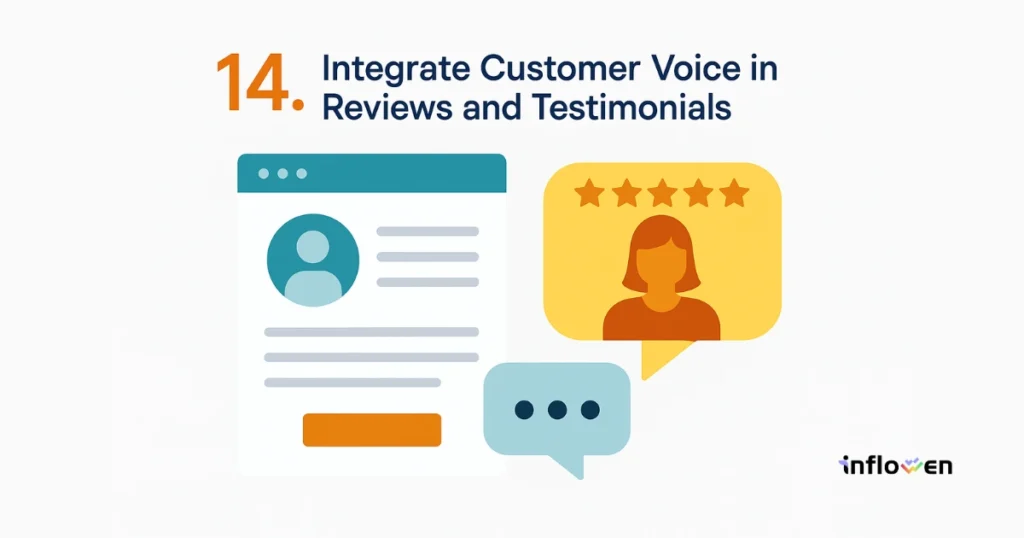
14. Integrate Customer Voice in Reviews and Testimonials
Integrating the customer’s voice means using the words and feedback of your actual customers in your marketing, particularly through online reviews and testimonials. For local SEO, this has a dual benefit: (1) Prospective customers in your area are heavily influenced by reviews and personal recommendations, and (2) search algorithms take into account review signals (both quantity and quality) for local rankings. By encouraging and highlighting authentic customer reviews and featuring testimonials on your website (with permission), you build trust and also feed search engines a steady diet of user-generated content about your business.
Tips: First, actively encourage satisfied customers to leave reviews on Google, Yelp, Facebook, and other relevant platforms. Often, a simple ask via email or a follow-up text with a direct link can dramatically increase your review count. Make it easy – provide the link, and maybe even guide them on what aspects to mention (e.g., “It would help if you could mention the service you received and the city/neighborhood, so others know we serve their area too.”).
Many customers will gladly mention that you helped them in “[City Name],” which adds local context to their review. Respond to every review, good or bad, in a professional and personal manner – this not only helps customer retention but also shows others you’re engaged. For your website, sprinkle testimonials (with names and locations if possible, like “– John D., West Seattle”) on key pages. The phrasing that customers naturally use might include long-tail keywords (“X Roofing fixed my leaky roof in under 2 hours – lifesaver!” has “fixed my leaky roof” which is a keyword phrase someone might search).
Customer voice lends credibility and also often naturally includes keywords you might not put in your polished marketing copy. Consider featuring reviews in a dedicated testimonials page and marking them up with Review schema (as noted in strategy #10). Video testimonials (a customer on camera speaking their experience) are golden if you can get them – you can transcribe those for even more content. Additionally, use snippets of reviews in your social media and Google Posts. A tactic: Every time you get a 5-star review with a detailed comment, turn that into a graphic or quote to share (with first name/last initial attribution). It encourages more people to review and spreads positive word-of-mouth.
Best Practices: Building a strong review profile is essential – 88% of consumers trust online reviews as much as personal recommendations, so a business with plentiful positive reviews has a clear edge. Aim for both quantity and quality of reviews across platforms. If you’re just starting, focus on Google and one or two others that matter in your industry. Don’t fake reviews – aside from being unethical, Google’s algorithm and users are good at sniffing out inauthentic feedback. Instead, consider doing things worth talking about: exceptional service that people want to review. Also, integrate the language customers use into your content strategy. Pay attention to phrases in reviews: if many people say “affordable” or “friendly service,” make sure those points come across in your site content too (that’s clearly what resonates).
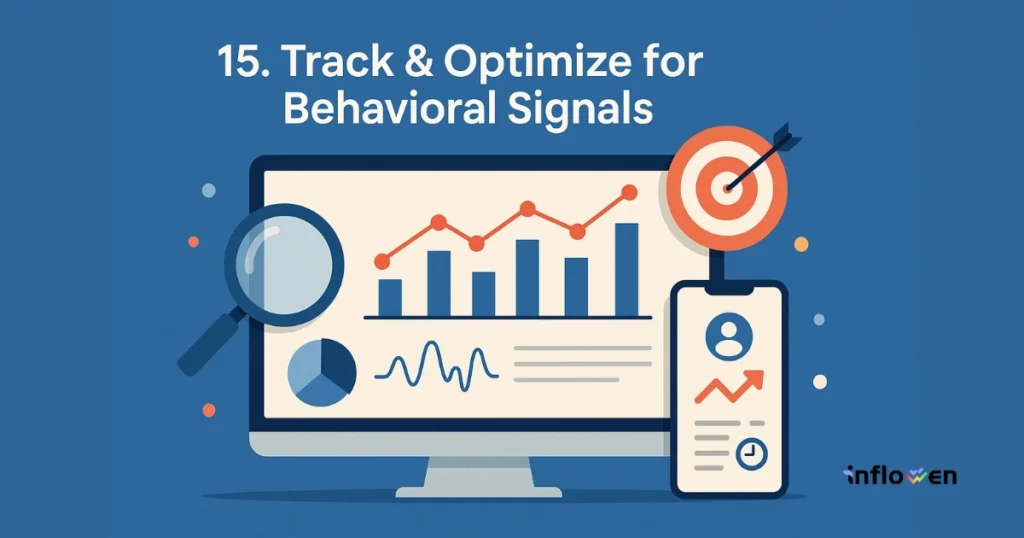
15. Track & Optimize for Behavioral Signals
Behavioral signals are the ways in which users interact with your online presence – things like click-through rate (CTR) on search results, dwell time (how long they stay on your site), bounce rate (if they quickly leave your site), and engagement with your Google Business Profile (clicking “Call,” “Directions,” etc.). In local SEO, Google likely monitors these kinds of user behaviors as quality signals. For instance, if searchers frequently click your listing and then don’t bounce back to the results immediately, it suggests your listing was relevant and satisfying. Similarly, if lots of users ask for directions to your business or call you via your GBP, it indicates popularity/utility. By tracking these metrics and optimizing for better user engagement, you can improve those signals, which may help your rankings and certainly will improve your conversion rates.
Tips: Use Google Analytics tools to monitor how local visitors behave on your site. In Google Analytics (GA4), look at metrics like engagement time and conversions broken down by location, if possible. Also, use Google Search Console to see CTR for your pages for local-intent queries – if a page has a low CTR in search, its title or meta description might not be enticing enough compared to competitors. Experiment with more compelling titles (“#1 Plumber in [City] – 24/7 Fast Service”) and see if CTR improves.
Keep an eye on bounce rate and try to correlate with sources; if traffic coming from Google Maps bounces more, maybe the landing page isn’t providing what those map users need (perhaps add a map or parking info on that page). For GBP, Google provides some Insights: how many calls, direction requests, website clicks – track these month over month. An upward trend can indicate your local SEO is working (more visibility), whereas a sudden drop might indicate an issue (maybe your hours were wrong during a holiday, etc.).
To optimize behavioral signals, ensure that when someone clicks your site from search results, they immediately find useful, locally relevant info – no one should hit your homepage and wonder if they’re in the right place. Make your value prop and location clear (“Serving [City] for 20+ years…” right on the landing page). Improve site speed and mobile usability (as discussed) – slow, clunky pages drive people away.
Internally, link in ways that keep users browsing related info. For example, if they landed on a blog post about “Summer Roofing Tips [City]”, have a clear callout or banner that says “Need a Roofer in [City]? Get a free quote!” leading to your service page. This guides the user to the next step rather than leaving.
Best Practices: Behavioral signals can be a bit indirect to measure, but they are believed to contribute around 9% or so of local ranking factors. Essentially, positive behavioral signals (users engaging, spending time, not pogo-sticking back to search results) tell Google that your result was valuable. One way to boost these signals is by providing a great user experience overall. That means relevant content, fast loading, attractive design, and easy navigation. If you notice users often drop off on a certain page, investigate why – maybe the info they want is buried or the page lacks a clear next step. A/B testing different page layouts or content emphasis could help.
What are the Local SEO trends for 2025?
Staying on top of current trends is crucial, as local search evolves with technology and consumer behavior. Here are some key Local SEO trends for 2025 and what they mean for your business:
- Voice and Conversational Search Dominance: More people are using voice assistants (Siri, Alexa, Google Assistant) and AI chatbots to find local information. Queries are becoming longer and phrased as natural questions. For example, instead of typing “pizza NYC”, users might ask, “Where’s the best pizza place open near me right now?” Optimizing for this means focusing on long-tail, question-based keywords and providing succinct answers.
- Hyperlocal Targeting & Community Focus: Targeting very specific locales (down to neighborhoods or even city blocks) is a growing strategy. With rising competition, businesses are honing in on hyperlocal keywords and community engagement. We’re seeing more content and ads tailored to “near me” and “[service] in [neighborhood name]”. Google is also getting better at pinpointing user location to serve hyperlocal results.
- AI Integration in Search Results: Google and other search engines are increasingly integrating AI-generated answers (Google’s SGE – Search Generative Experience) and overviews at the top of search results. In local search, this could mean an AI summary of “best options” for a query, pulling from various sources. Already, we see AI answering some local questions by summarizing reviews or content.
- Zero-Click and Knowledge Panel Prominence: Google continues to refine the local pack and knowledge panel results to answer users’ needs immediately. In 2025, even more local searches may end without a click to a website, because Google provides the info (address, phone, reviews, even booking options) right in the results. Zero-click searches are on the rise. This trend means you must treat your Google Business Profile as the landing page.
- Augmented Reality (AR) and Visual Search: With advancements in AR, local search is becoming more interactive. Apps like Google Lens can identify storefronts or products through a camera and overlay information. Yelp’s Monocle and other AR experiences offer on-the-spot local business info. Visual search is also expanding – users can search using images (snap a photo of a restaurant, get reviews and details). Local businesses should optimize images (with proper alt text and geo-tags) and ensure visual branding is consistent, so they’re recognizable in these contexts.
- Local Services Ads and Pay-to-Play Elements: Google has been expanding Local Services Ads (LSAs) – those are the “Google Screened” or “Google Guaranteed” listings that often appear at the very top for certain services (plumbers, lawyers, etc.). By 2025, more industries and markets are covered by LSAs. This means a portion of the local search results page is essentially paid.
- Importance of Local Expertise and Authenticity: Both users and search algorithms are gravitating toward content that demonstrates local expertise. In 2025, simply having generic SEO articles won’t cut it. Google’s emphasis on E-E-A-T (Experience, Expertise, Authority, Trustworthiness) applies locally too. Content that shows firsthand knowledge of the area (“We’ve been serving the Oak Ridge neighborhood for 20 years, we know the unique challenges of XYZ here…”) can set you apart.
- Growth of Online Local Marketplaces: Beyond Google, other platforms are ramping up local discovery features. For example, Facebook local groups and Marketplace influence local business visibility. Nextdoor is huge for neighborhood recommendations. Even Amazon is experimenting with connecting users to local service providers. By 2025, more consumers might find businesses through an app or platform specific to local community or commerce.
In summary, 2025’s local SEO landscape is shaped by more conversational and AI-driven search, hyperlocal targeting, richer search results without clicks, new interactive technologies like AR, and an ongoing push for authenticity and excellent user experience. By staying aware of these trends and adapting your strategy accordingly, you can continue to outrank competitors. For instance, optimizing for voice/AI, keeping your info readily available for zero-click situations, and embracing community-driven content will all be key moves to succeed in local SEO in 2025.
How to Use AI in Local SEO?
Artificial Intelligence (AI) is becoming a game-changer in SEO, and local SEO is no exception. Businesses in 2025 are increasingly leveraging AI tools and techniques to improve their local search rankings and efficiency in SEO tasks. Using AI in local SEO can take many forms: One major application is in content creation and optimization.
AI writing assistants (like GPT-based tools) can help generate local content ideas or even draft portions of blog posts, saving time. For example, you could prompt an AI with “Write a paragraph about why [City] is great for outdoor dining” to use in a restaurant’s page. While human review and editing is essential (to ensure accuracy and the right tone), AI can handle a lot of grunt work in copywriting and meta description creation tailored to local keywords. AI can also analyze existing content and suggest improvements or additional local LSI keywords to include.
How to Optimize GBP for Your Local Business?
Optimizing your Google Business Profile (GBP) (formerly Google My Business) is one of the most impactful things you can do for local SEO, and doing it right can significantly boost your local visibility. Here’s how to optimize GBP for your local business:
- Complete and accurate information
- Compelling description
- Photos and Videos
- Reviews and Ratings
- Utilize GBP features
- Maintain NAP consistency
- Monitor insights
Optimizing a Google Business Profile is an ongoing process, not a one-and-done. Regularly check your profile to answer new Q&As, update photos, and keep info current. Google sometimes updates features or might even correct your info based on user suggestions (it can happen), so vigilance is key. In essence, GBP optimization is about making your information comprehensive, engaging, and trustworthy – so when Google’s algorithms and human users evaluate your local presence, you shine brightly and reliably.
What are some of the Local SEO marketing tools for work easier?
Local SEO can be complex and time-consuming, but there’s good news: a plethora of marketing tools are available to make the work easier and more effective. These local SEO tools help with everything from keyword research and rank tracking to citation management and review monitoring. Here are some of the top tools and how they assist your local SEO efforts:
- Google Business Profile
- BrightLocal
- Moz Local
- Semrush or Ahrefs
- Local Falcon
- Whitespark
- Yext
In essence, leveraging these tools can significantly streamline your local SEO workflow. For example, using a single dashboard to update your business info across 20 sites (rather than visiting each site) saves hours and ensures consistency. Rank tracking tools let you measure the impact of your work – did that GBP optimization or new batch of citations move the needle? You’ll see it. Many of these tools also offer reports that you can use to track progress over time or share with a team.
Tusar Ahmed is the Founder and Senior SEO Specialist at Inflowen. With over seven years of hands-on experience in SEO, local search optimisation, and keyword strategy, he simplifies complex digital concepts into engaging, actionable insights.
Tusar has worked on 250+ projects across the UK and beyond, helping businesses of all sizes improve their search visibility and achieve measurable growth. His writing blends technical expertise with a clear, approachable tone—making SEO feel both accessible and results-driven.
Follow his content for a fresh, practical perspective on ranking better, reaching the right audience, and staying ahead in the ever-evolving digital landscape.



